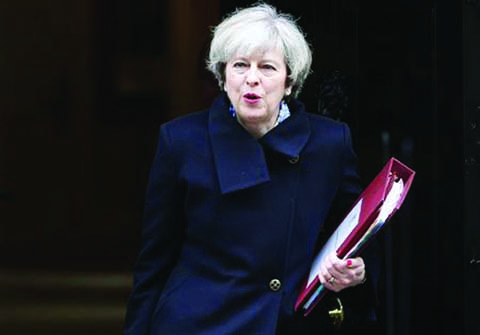
Reuters, London :
British Prime Minister Theresa May is unlikely to bow to political expedience in Brexit negotiations but will make up her own mind about what she believes is best and refuse to give ground – that’s if past form is anything to go by.
May, who backed the campaign to stay in the European Union in last June’s referendum, will have to carry or quell the eurosceptics in her ruling Conservative Party as she formulates her negotiating priorities and strategy.
The 60-year-old – often described as “sphinx-like” in the British press – has revealed little in her first eight months as leader about how she will approach divorce talks with Brussels, perhaps wary of weakening her hand.
But her previous experience of trying to win the support of the eurosceptics who drove Brexit could offer some clues about her modus operandi: two years ago when as interior minister she sought to opt back into the European Arrest Warrant against the wishes of many in her party.
May got her way in the end after a bruising encounter over the warrant, which speeds extradition between member states. She did not backtrack an inch and forced it through parliament.
Her conduct and strategy present a picture of a stubborn negotiator who sticks as firmly as possible to what she believes is in Britain’s best interests.
Several government aides and a lawyer with knowledge of the matter said she was driven by a conviction she was right – that Britain needed to adopt the warrant and other EU justice measures – and, while acknowledging their shortcomings, would not let anything stand in her way.
Supporters say her ultimate success offer evidence of her political steel, know-how and negotiating skills. Critics say the self-belief that drove her to open a rift in her party and face down a rebellion could be a weakness if it becomes inflexibility that hinders Britain striking winning the best deal.
“If you believe in what you’re doing, that’s key. If you do believe you’re doing the right thing, that gives you resilience,” May told the BBC’s Desert Island Discs program less than two weeks after the fight. She steadfastly refused to allow lawmakers a vote on the arrest warrant which she said was in “our national interest”, reneging on a pledge to the outrage of the eurosceptics, instead offering only a vote on a broader package of justice measures.
In a rare admission that her strategy may have been misjudged, she added in the BBC interview: “If I was starting it again now, would I do it in a different way? Given the understanding of how parliament felt then, perhaps I would.”

